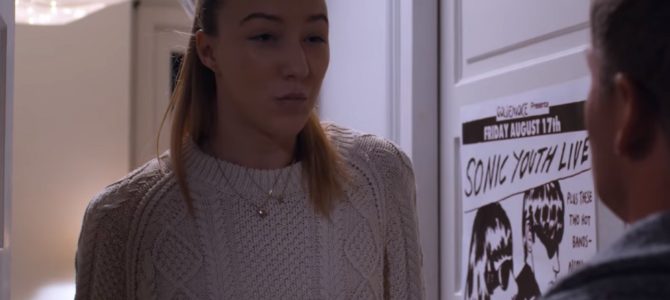
When Netflix first released trailers for “Tall Girl,” the movie received steady backlash. People wanted to know why a skinny, white, affluent girl was being treated with minority status because of her height.
Jodie, the titular tall girl, opens the movie with the line, “You think your life is hard? I’m a high school junior wearing size 13 Nikes. Men’s size 13 Nikes. Beat that.” As a six-foot-tall woman myself, I was intrigued by the premise, and the movie surprised me. Despite a dense premise and definite over-exaggeration (no way she wears a men’s size 13), “Tall Girl” came through with some very sweet moments.
The film involves Jodie, a six-foot-one-(and-a-half) girl, falling for the tall foreign exchange student. She acts like this boy is the only other tall person her age, and so do the filmmakers. Every other character in the movie comes up only to her shoulders. The lengths they go to remind audiences that Jodie is very tall are rivaled only by those in “Lord of the Rings” when Gandalf goes to the Shire.
“Tall Girl” has a good heart, and the overall message of self-acceptance is always a great one to hear, but the screenwriters approached it clumsily. It was hard for me (again, I’m six feet tall) to relate to most of this movie. Being tall wasn’t the worst of my social issues when I was in high school—crippling social anxiety and lack of confidence won that spot.
Jodie doesn’t struggle with this, although it’s a far more common dilemma for teenagers to confront. Sure, she has trouble accepting her height, and she fumbles over her words every now and then, but she’s otherwise depicted as smart, funny, and a bomb public speaker.
The movie also doesn’t get the real problem of being tall: no clothes fit. Watching the inevitable mid-film shopping and makeover scene, I had to wonder where she was shopping that all the dresses and jeans fit. Jodie is never caught wearing high-water pants or shirts that fit too big widthwise just to compensate lengthwise. Despite being tall, she’s cute, confident, and has not one, not two, but three boys pining after her.
I considered clicking out of the movie, but something caught me. After having her heart broken, Jodi runs up to her room and locks the door. After a moment’s hesitation, her father follows her up and knocks. When she doesn’t answer, he assures his daughter he’s not there to upset her. “I just wanted to tell you I love you,” he says, “and I’m here for you if you need me, okay?” He stands by her room a little longer before wandering back downstairs. Not too long afterwards, Jodie joins him. They don’t speak, but she rests her head on his shoulder.
Up until this point in the film, Jodie’s father is portrayed as nervous and bumbling, struggling to understand his daughter’s frustrations. He goes out of his way to make his daughter feel like she fits in. In the process, however, he makes her more uncomfortable.
Too often in Hollywood, this is the case. Parents, especially fathers, end up the butt of the joke or just another antagonist. They seem incapable of relating to their children. That’s why I wasn’t surprised by the initial ineptitude of Jodie’s father. I was surprised when the plot gave him an opportunity to learn from his mistakes and become the support Jodie needed.
Although I couldn’t connect with the portrayal of Jodie’s height issues, I could connect with this father-daughter moment. Girls need fathers. That fact is constantly downplayed in today’s anti-patriarchy society, and movies are a prime example.
Most films play up the idea that girls can make it on their own. They try to make us think we don’t need anything but a strong sense of self-worth. The consequence is young girls learning that it’s okay to disregard their parents. Girls begin to blindly believe their parents will never understand them. That’s a detrimental mindset.
“Tall Girl” takes a break from its predictable plot to remind young women we need our fathers. Dads are meant to be part of our biggest support system, but they can’t be there for us if we push them away. If you can get past the campiness, “Tall Girl” hides within its plot a few good lessons about family and self-acceptance. It’s actually pretty funny, too.









